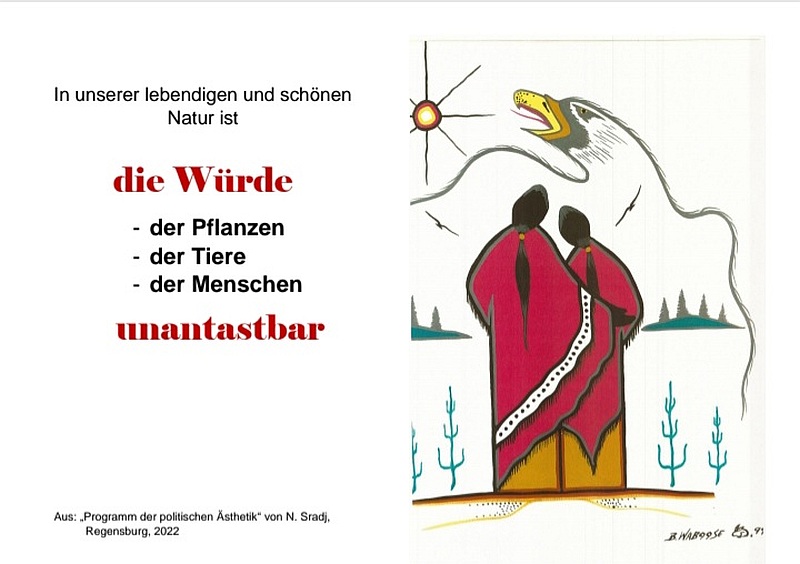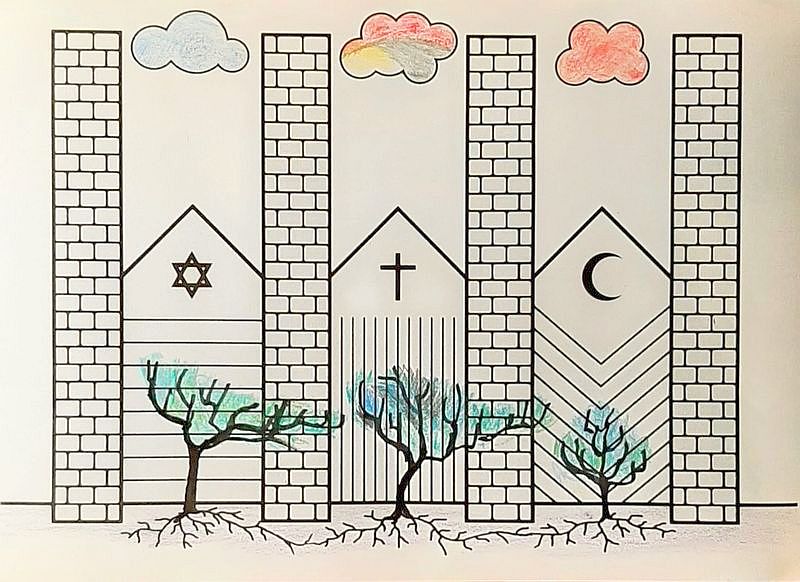Orientierung in der heutigen Welt – die UNESCO in der Bürokratiekrise
von Dr. Nadim Sradj, Repräsentant der Union Arabischer Medizinern Europa (ARABMED), bei der UNO in New York
Regensburg, Februar 2023 - Etablierte Institutionen haben viele Vorteile, nämlich langwierige Erfahrungen und Erlebnisse, aber auch Nachteile, wie die Versteifung und Alterung der ausführenden Organe, die sich im Laufe der Zeit zur Gerontokratie (Herrschaft der Alten) entwickeln. Wir beobachten zurzeit eine Kluft zwischen dem Bewusstseinswandel der Menschen und einem Bewusstseinsstillstand der Institutionen, vergleichbar mit der geistigen Situation der Kurie in der katholischen Kirche, die Papst Franciscus als "spirituelle Alzheimer" bezeichnet hat.

Diese Diskrepanz in der geistigen und moralischen Entwicklung birgt die Gefahr der Isolation solcher Institutionen weg von der Gesellschaft. Im Laufe der Zeit entwickelt sich daraus eine Art institutionelles Eigenleben, das mit dem Leben von Soldaten in den Kasernen vergleichbar ist. Im weiteren Verlauf kann dieser Vorgang zur Entfremdung und auch zu anachronistischen (unzeitgemäßen) Verhaltensweisen führen.
Um aus dieser Krise wieder herauszukommen, bietet sich die Ästhetik auf sinnesphysiologischer und sinnespathologischer Grundlage an. Durch sie ist man in der Lage, die Signale der Zeit und des Zeitgeistes wahrzunehmen und darauf adäquat im Sinne einer rationalen Reiz-Reaktions-Beziehung zu reagieren. Des Weiteren öffnet uns die Ästhetik die Augen für die kreative Wahrnehmung des Schönen und für seine Bedeutung im menschlichen Zusammenleben.
Die Ästhetik ist das Instrument der aufmerksamen Empfindung und der kritischen Beurteilung von Handlungen und ihren Ergebnissen. Dabei steht nicht das partikulare Interesse, das Profitdenken, sondern die Erkenntnis von Werten und von der Nachhaltigkeit menschlicher Entscheidungen auch in Bezug auf die Umwelt im Mittelpunkt. Das bedeutet: Erhalt sowohl der Güter des Weltkulturerbes, als Symbol der nationalen Identität eines Volkes, als auch die Verantwortung für Tiere und Pflanzen, d.h. für die Natur als unteilbare lebendige Einheit zu übernehmen. Denn auch Tiere und Pflanzen und die intakte Natur haben eine Würde, die vom Menschen und seinen Institutionen respektiert und verteidigt werden muss.
Solange jedoch Tiere juristisch gesehen als "Sachen" betrachtet und entsprechend behandelt werden und solange der Raubbau an den natürlichen Ressourcen (Regenwald, Fracking usw.) fortgesetzt wird, ist dies nicht der Fall. Hier ist ein Umdenken weg von der Anthropo-Zentrik hin zum Bio-zentrischen zwingend erforderlich. Das große Erdbeben von 2023 in Syrien und der Türkei ist ein Signal der ungeheuerlichen Naturgewalt, das den Satz Kants "Der menschliche Verstand schreibt der Natur ihre Gesetze vor" eindeutig widerlegt.

Menschliche Trennung des natürlich Untrennbaren (Himmel und Erde in den drei Religionen)
Orientation in today's world + UNESCO in the crisis of bureaucracy
Dr. Nadim Sradj, M.A. Regensburg (Germany). Representative of the Union of Arab Physicians in Europe (ARABMED) at the UN in New York
February 2023 - Established institutions have many advantages, namely long-lasting experience, but also disadvantages, such as the stiffening and aging of the executive organs, which in the course of time develop into gerontocracy (rule of the old). We are currently observing a gap between the change in people's consciousness and a stagnation in the consciousness of institutions, comparable to the spiritual situation of the Curia in the Catholic Church, which Pope Franciscus has called "spiritual Alzheimer's."
This discrepancy in spiritual and moral development risks isolating such institutions away from society. Over time, this develops into a kind of institutional life of its own, comparable to the life of soldiers in barracks. As it progresses, this process can lead to alienation and also to anachronistic (outmoded) behavior.
In order to get out of this crisis, aesthetics offers itself on a sensory-physiological and sensory-pathological basis. Through it, one is able to perceive the signals of the time and the zeitgeist (spirit of the age) and to react to them adequately in the sense of a rational stimulus-response relationship. Furthermore, aesthetics opens our eyes to the creative perception of beauty and to its importance in human coexistence.
Aesthetics is the instrument of attentive sensation and critical judgment of actions and their results. The focus is not on particular interest, on the profit orientation, but on the recognition of values and of the sustainability of human decisions, also in relation to the environment. This means: preserving both the goods of the world cultural heritage, as a symbol of the national identity of a people, and taking responsibility for animals and plants, i.e. responsibility for nature as an indivisible living entity.

Till now, in many countries animals and plants are legally regarded as things, not as livings beings.
For animals and plants and intact nature also have a dignity that must be respected and defended by man and his institutions. However, as long as animals are legally considered "things" and treated accordingly, and as long as the overexploitation of natural resources (rainforest, fracking, etc.) continues, this is not the case. Here a rethinking away from anthropocentric to biocentric is imperative. The great earthquake of 2023 in Syria and Turkey is a signal of the monstrous force of nature, which clearly refutes Kant's sentence "Human reason dictates its laws to nature."

Human separation of heaven and earth in the three religions
L'UNESCO face à la crise de la bureaucratie
Dr.Nadim Sradj, M.A, Regensburg (Germany), Représentant de l'Union des médecins arabes en Europe (ARABMED), auprès de l'ONU à New York (ONG)
Les institutions établies ont de nombreux avantages, à savoir des expériences, mais aussi des inconvénients, comme le raidissement et le vieillissement des organes exécutifs, qui évoluent au fil du temps vers la gérontocratie (le règne des personnes âgées).
Nous observons actuellement un fossé entre le changement de conscience des gens et un blocage de conscience des institutions, comparable à la situation spirituelle de la Curie dans l'Église catholique, que le pape François a qualifiée d'"Alzheimer spirituel".
Ce décalage dans l'évolution spirituelle et morale comporte le risqué de l'isolement de telles institutions loin de la société. Au fil du temps une sorte de vie institutionnelle autonome se développe, comparable à la vie des soldats dans les casernes. Par la suite, ce processus peut mener à une aliénation et à des comportements anachroniques (hors du temps).
Pour sortir de cette crise, l'esthétique sur base physiologique sensorielle et pathologique s'offre à nous. Grâce à elle, on est en mesure de percevoir les signaux de l'époque et de l'esprit du temps et de réagir de manière adéquate dans le sens d'une relation rationnelle entre stimulus et réaction. De plus, l'esthétique nous ouvre les yeux sur la perception créative de la beauté et de son importance dans la cohabitation humaine.
L'esthétique est l'instrument d'une perception attentive et d'une évaluation critique des actions et de ses résultats. Ce n'est pas l'intérêt particulier, la pensée du profit, mais la reconnaissance des valeurs et de la durabilité des décisions humaines, y compris par rapport à l'environnement. Cela signifie : préserver les biens du patrimoine culturel mondial, en tant que symbole de l'identité nationale d'un peuple, mais aussi de la responsabilité envers les animaux et les plantes, c'est-à-dire envers la nature en tant qu'entité vivante indivisible.
Car les animaux et les plantes, ainsi que la nature intacte ont une dignité que l'être humain et ses institutions doivent respecter et qui doit être défendu. Toutefois, tant que les animaux seront considérés juridiquement comme des "choses" et traités en conséquence, et tant que l'exploitation abusive des ressources naturelles (forêt tropicale, fracturation, etc.), ce n'est pas le cas.
Un changement de mentalité est ici absolument nécessaire, à savoir s'éloigner de la anthropocentrisme vers le biocentrisme.
Le grand tremblement de terre de 2023 en Syrie et en Turquie est un signal d'une violence naturelle inouïe, par qui la phrase du philosphe Kant "L'entendement humain dicte ses lois à la nature" est clairement réfutée.

Aujourd'hui encore, dans de nombreux pays, les animaux et les plantes sont juridiquement considérés comme des "choses", et pas comme des êtres vivants.

La séparation humaine de ce qui est naturellement inséparable (le ciel et la terre)
